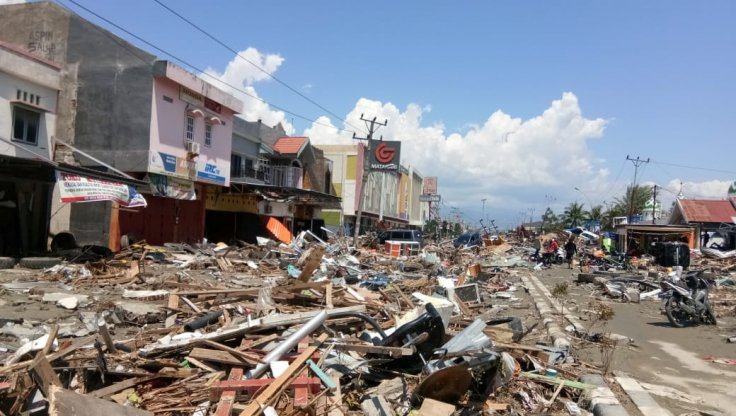
Indonesian President Joko Widodo made a second visit to earthquake-devastated Sulawesi island on Wednesday, saying efforts to help survivors were gearing up and he was keen to see economic activity resume.
Five days after disaster struck, time is running out for anyone trapped under collapsed buildings, while aid workers warned of increasing desperation in hard-hit outlying areas that have yet to get any help at all.
The official death toll from the 7.5 magnitude quake that struck the west coast of Sulawesi last Friday stood at 1,234, many killed by tsunami waves triggered by the quake.
But officials fear the toll could soar, as most of the confirmed dead have come from Palu, a small city 1,500 km (930 miles) northeast of Jakarta, and losses in remote areas largely cut off since Friday have yet to be determined.
Underlining a growing sense of urgency, Widodo made his second visit to the disaster zone, putting on an orange hard hat to talk to rescue workers at a collapsed Palu hotel.
"What I've observed after returning now is heavy equipment has arrived, logistics have started to arrive although it's not at maximum yet, fuel has partly arrived," Widodo told reporters.
Asked about efforts to restore electricity, he said:
"This is all a process. Most importantly, I've asked the governor to reopen economic centers so people start to return to daily activities, while the evacuation process continues, and later rehabilitation and reconstruction."
Widodo, who will seek re-election next year, called on Tuesday for reinforcements in the search for victims, saying everyone had to be found. He repeated that on Wednesday, after inspecting what he called an "evacuation" effort at the Hotel Roa Roa, where he said some 30 people lay buried in the ruins.
"We'll continue this process so all the victims can be retrieved," he said.
At least seven cargo planes arrived at Palu airport earlier on Wednesday carrying tonnes of aid, some bedecked in the red and white national colors and stamped with the presidential office seal declaring: "Assistance from the President of Republic of Indonesia".
Sutopo Purwo Nugroho, spokesman of the National Disaster Mitigation Agency, said late on Tuesday rescuers had reached all four of the badly affected districts, which together have a population of 1.4 million, but he declined to give an estimate of casualties.
"We hope the death toll does not rise," he said. "We're continuing rescue operations but right now the team is racing against time."
'GOVERNMENT MISSING'
The quake brought down hotels, shopping malls and thousands of houses in Palu, while tsunami waves as high as six meters (20 feet) scoured its beachfront shortly afterwards.
About 1,700 houses in one neighborhood alone were swallowed up by ground liquefaction, which happens when soil shaken by an earthquake behaves like a liquid, and hundreds of people are believed to have perished, the disaster agency said.
Adding to Sulawesi's woes, the Soputan volcano in the north of the island, about 600 km (375 miles) northeast of Palu, erupted early on Wednesday but there were no reports of any casualties or damage. Ash was not expected to disrupt flights.
But concern is growing about conditions in remote areas, many of which have been cut off by destroyed road, landslides and downed bridges.
Aid worker Lian Gogali said the situation in badly hit Donggala district was very difficult.
"Everyone is desperate for food and water. There's no food, water, or gasoline. The government is missing," she said.
She said her aid group had been sending in a trickle of rations into the district of some 300,000 people by motorbike.
The national disaster agency has said tents, food, water and sanitation facilities for more than 60,000 displaced people are in short supply.
Police have done little to stop outbreaks of looting. The government has played down the problem, saying victims could take essentials and shops would be compensated.
The government has said it would accept offers of international aid, after shunning outside help this year when two major earthquakes struck Lombok island, south of Sulawesi.
U.S. President Donald Trump extended condolences in a phone call with Widodo, State Department spokeswoman Heather Nauert told reporters in Washington. The United States has provided initial funding, deployed government disaster experts and was working to determine what other help can be given, she said.
Sitting on the seismically active Pacific Ring of Fire, Indonesia is one of the world's most vulnerable countries to quakes and tsunamis. A quake in 2004 triggered a tsunami across the Indian Ocean that killed 226,000 people in 13 countries, including more than 120,000 in Indonesia.









